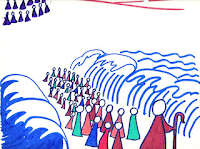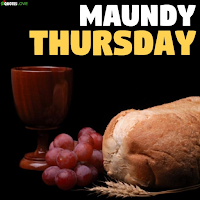Our
gospel reading from John 13:1-17; 31b-35 stresses the washing of the feet. And a lot of churches, on this night, have a
service that features, no pun intended, the washing of feet. Here’s my take on that, I don’t wash feet,
not because I think that I’m at all above washing feet, but because I don’t see
that, in this passage, as a lasting ordinance that Jesus wants us washing each
other’s feet.
I think
to understand what Jesus is doing here, we need to understand the context in
which it happens. In the first century,
there were no sidewalks. People walked
on dirt roads that were often little more than footpaths or trails. And they were dusty. And they wore sandals when they walked, open
sandals. They were designed to protect
the soul of your feet, with little more than leather straps to hold them
on. Open sandals. We still have similar things today.
But
when you enter a home, you took your sandals off, because you don’t want to
track all that dust into people homes. So
you usually went barefoot inside. But
the sandals didn’t keep your feet clean, the tops would get as dusty as the
bottoms of your feet. So they often had
servants to wash your feet as you entered someone’s home.
So we
come to night of Jesus celebrating the Passover feast with his disciples. There were just the twelve disciples present,
there weren’t any servants there. I understand
that some of the disciples went on ahead to prepare the meal, that my
interpretation. This wasn’t a
restaurant, this was the upper room of someone’s house that Jesus was allowed
to use. Nowhere does it say that the
meal was prepared for them, in fact in Matthew 26:19, it says, “So the
disciples did as Jesus had directed them and prepared the Passover.”
My
point in that is that it was just the disciples. Some of them went ahead and prepared the
Passover meal, but no one thought about cleaning their feet. But this is a borrowed upper room, you want
to keep it as clean as possible, So Jesus took advantage of the opportunity to
teach them a lesson about serving one another.
It’s interesting that while many churches think that Maundy Thursday is
all about Jesus washing each others feet, John is the only one of the four gospels
that tells about the feet washing.
And,
interesting enough, John doesn’t mention communion, the Lord’s Supper isn’t
mentioned at all in John’s gospel, while all three of the other gospels mention
it, and don’t mention feet washing. To
me, as I look at the things that happened at that Passover meal, I see
communion as a lasting ordinance, and the washing of feet as just another
lesson on how we should be serving one another.
So
tonight, we’re emphasizing communion, or the Last Supper. We know from our Seder services in other
years that communion wasn’t just given during any old meal. This was the Passover seder, where they remembered
the exodus from Egypt, one of the greatest things to happen the Jewish people
in the history of the Jewish people.
And
during the meal, Jesus took symbols from the Passover, and applied them to
himself. So that God’s people would
remember Jesus. And monthly we come
together at the table, and we eat bread, though it’s not unleavened bread, we
break bread, or at least we did before Covid, and the bread, in the Passover
was called the Afikomen, that term literally means “the one to come.”
It
comes up in the seder early, when the host takes three pieces of unleavened
bread, breaks the middle one in half, and tells the children to hide their eyes
while he hides that piece of bread. Then
he says these words, “The Afikomen will return to end our Passover Seder.” For thousands of years, the Jewish people
have been uttering those words as they began their Passover celebrations. Jesus was the one who came, the Afikomen, who
came to end their Passover Seders. They
don’t do them anymore. Now, we remember
Jesus, and his death on the cross for our sins, and we remember him through the
Lord’s Supper, “in remembrance of me.”
Our
first reading was from Exodus, and reminds us the requirements for the
Passover. What they had to do on that
first Passover. But it wasn’t just
that. It was given as a lasting
ordinance. They were to do it each year,
to remember what God had done for them.
That’s why we do communion, to remember what Jesus did for us.
In 1
Corinthians, we saw a familiar passage about the Lord’s Supper. Paul passed on that ordinance to the Gentile
people in Corinth. They didn’t have the
law, they didn’t have to observe the Passover, but Paul is telling them that
they should be doing the Lord’s Supper, to remember what Jesus had done for
them.
And we
talked about the Afikomen already, represented by the bread, I want to talk
about the cup next. Paul said, in verse
25, “In the same way, after the supper he took the cup, saying, ‘this cup is
the new covenant in my blood; do this, whenever you drink it, in remembrance of
me.’” Back to the Passover Seder, if
you remember that, after the supper, they had the third cup, there were four
cups in the Seder.
The
third cup was the cup of redemption, the reminder that God was going to redeem
His people. Jesus said, this cup is the
new covenant in my blood. It was the cup
of redemption for the Jewish people. In
Jesus’ blood, the people of God find redemption. That’s the symbolism here. Jesus is the redemption of the people of
God. In His shed blood, we find redemption.
Which
brings us back to the feet washing, and the last reading from John. But at the end of chapter, they are still in
the upper room, Judas had just left, and Jesus gives them a new command, “Love
one another. As I have loved you, so you
must love one another. By this all men
will know that you are my disciples, if you love one another.”
The
foot washing was a way to show our love for others. He served as a servant, by washing their
feet, now they’re told to go and serve one another. And love one another. And it’s through our service, and it’s
through our love, that we show our faith to others.



